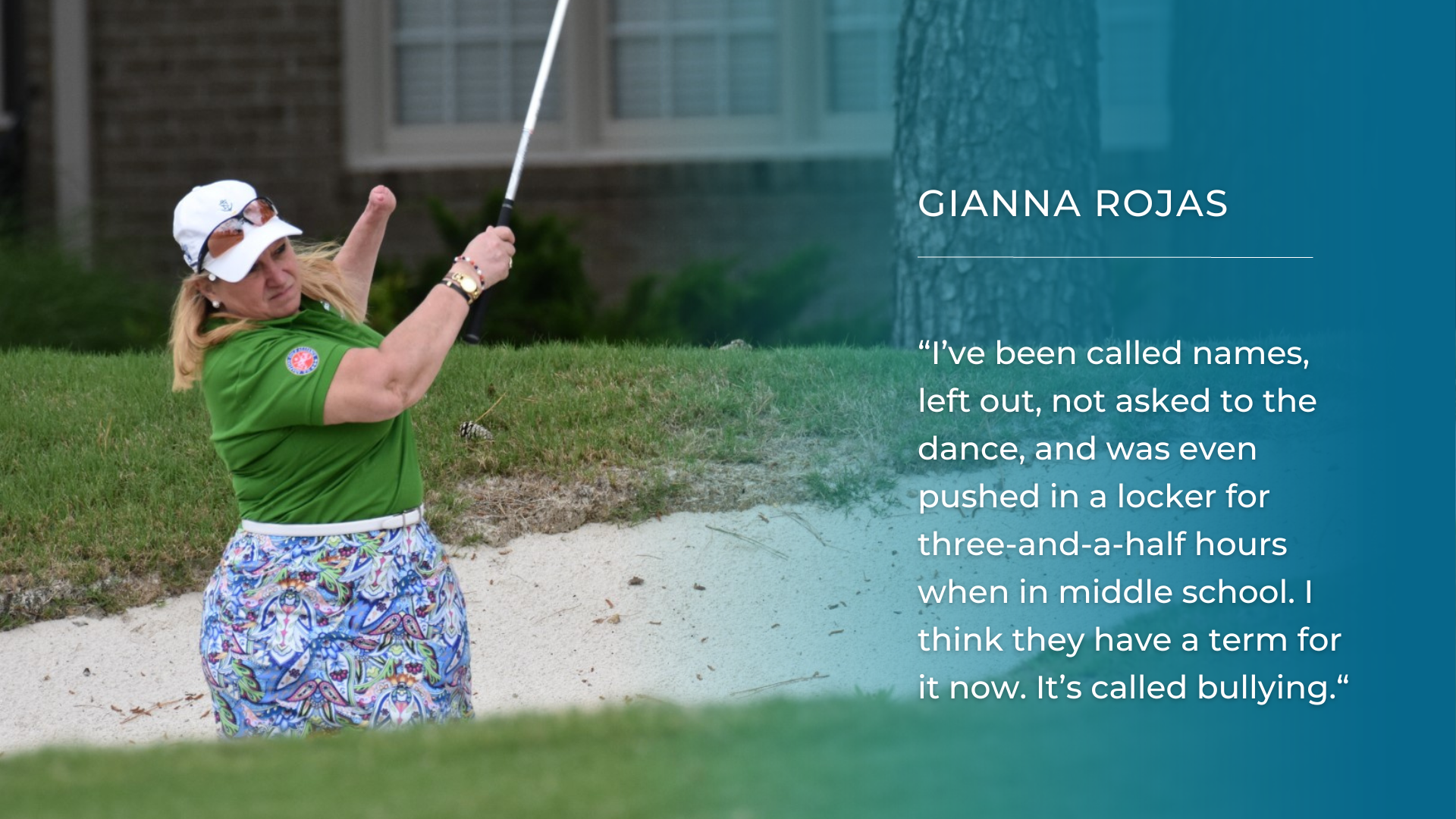Audio:
Gianna Rojas is a force of nature. Just spending a few minutes in her company reveals a friendly, open and passionate woman, who is comfortable in her own skin. Gianna is determined to spread the word that golf is for all, that everyone is differently-abled, and that having a disability does not define the person.
Born in what has been often cited as the cleanest city in the United States – Bath, in Maine – as the daughter of a military Father, Gianna came into the world as a much-anticipated child. Gianna’s father, Richard was stationed at the Naval Air Station in nearby Brunswick. As with every military family, they moved frequently to postings that took them all around the country. “Every couple of years we were off to a new mission,” says Gianna. It is tough enough to be the new kid, earning your place in the school community, leaving friends behind and then having to make new ones and all that entails, but Gianna had one more obstacle to overcome as she pursued the human need to connect.
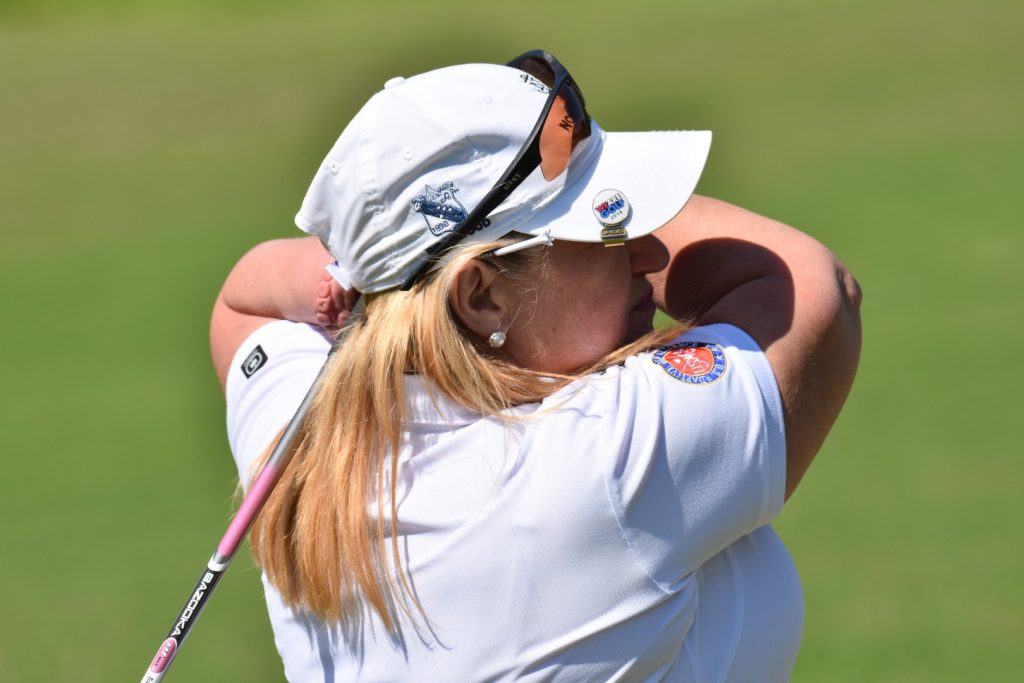
In the late fifties and sixties, expectant mothers were advised to take a medication called Thalidomide to combat the effects of morning sickness. Initially launched in 1957, it took four years for concerns regarding birth defects to surface. The drug was withdrawn immediately but during that period it had adverse effects on the development of an estimated 10,000 fetuses. Gianna was one such baby and it resulted in being born without fingers on her left hand. She can however take a positive from this start in life, saying, “I’m very glad for that opportunity and those experiences. Yes it was hard but now I can build rapport with anybody anytime, anywhere, everywhere in a matter of seconds…that was a skill that I had to learn. It was a survival skill for me.”
These were tough and character-building times for Gianna. Society, parents, and grandparents during that time taught their children, with the best of intentions, not to stare or ask questions as it would be rude. It was that mindset and culture, which nevertheless added to the isolation leaving Gianna feeling invisible and misunderstood. “I’ve been called names, left out, not asked to the dance, and was even pushed in a locker for three-and-a-half hours when in middle school. So it was very challenging, not only to be the new kid, but also the new kid that had a visible difference. It was a little tough. I think they have a term for it now. It’s called bullying.”
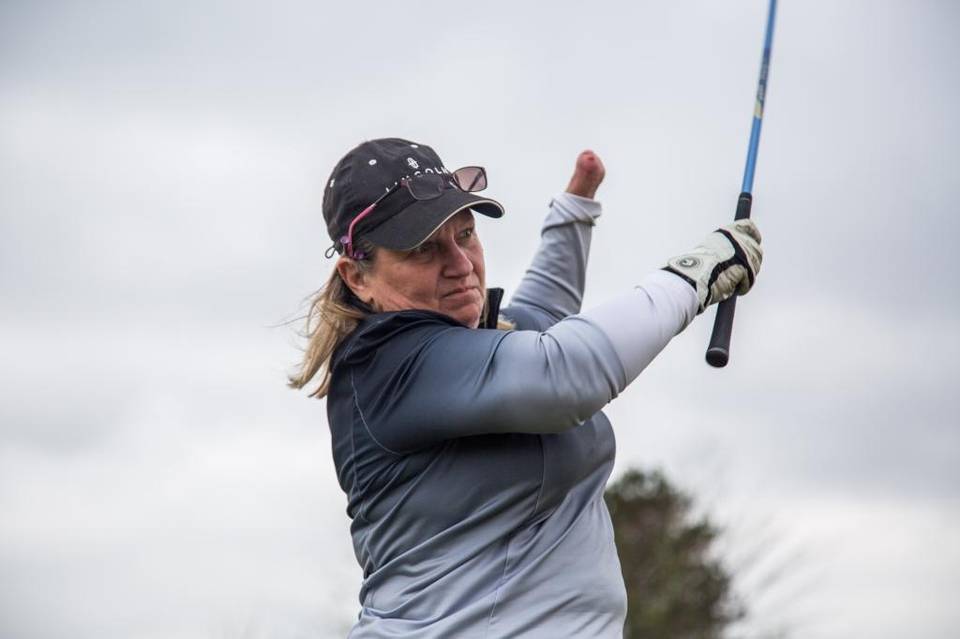
Sports didn’t really play much of a part of Gianna’s adolescence and only came into her life during her late twenties, when she met her soon-to-be husband. Raymond who was fully into his sports. Softball, football and golf were all part of the weekly schedule. Gianna would tag along, never really considering taking part until one day. “Raymond, his friends and his friends wives played at the weekends, and I started feeling like that 13-year-old girl again, being left out. I said, you know if I was able to learn how to do everything that I have throughout my life – I am a mother of two, I’ve got three grand babies, I’ve cleaned houses, changed diapers, and cooked, just like every other woman and mother does – then why not try to figure out how I can spend a little more time with my husband and learn to play golf.”
Gianna started hanging around with Raymond at the driving range when he was practicing. She would accompany him when he had a golf lesson, and one day blurted out, “Give me that. Let me try to figure this out.” Golf was just about to get its newest recruit, one that would shake-up the instructors as she looked to find a way to participate in the game.”The biggest challenge was trying to find someone who was able to help me. Most of the instructors that I have been exposed to had never taught anybody with anything other than a two-handed able-bodied golf swing. The mindset of the teaching professionals was that they needed to figure out how to help me get two points of contact on the club.”
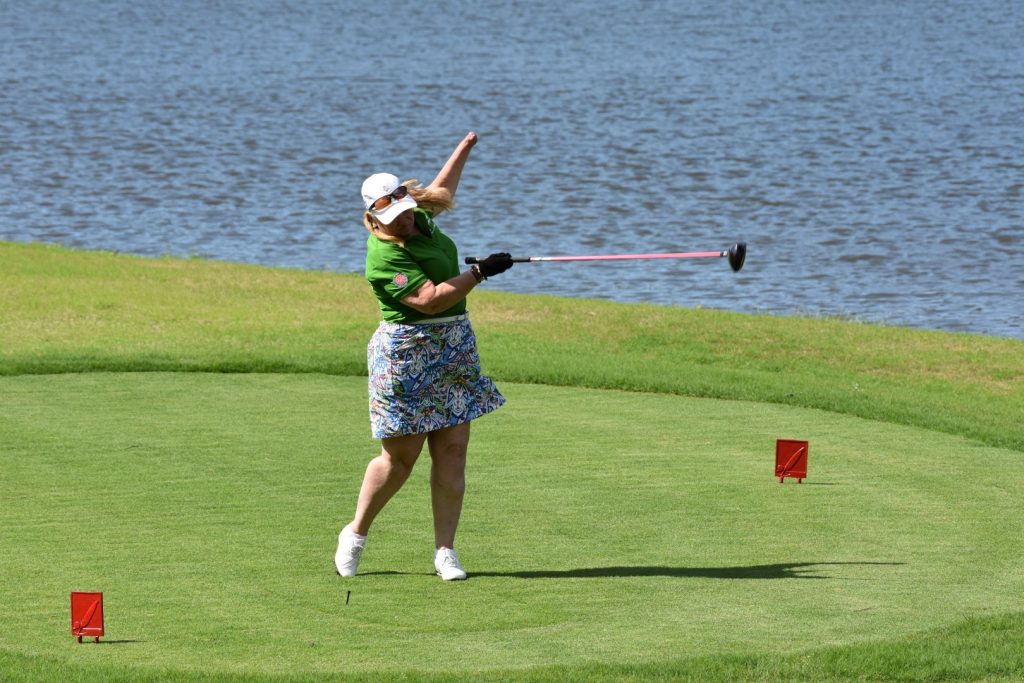
This was in 2010, and coaching has moved on a lot in the last decade with more and more professionals being better trained to work with golfers of all abilities. Gianna tried lots of ways to hold the club, tried prosthetics, and other adaptive resources, before coming to the realisation, “You know, when you’re born, you’re born with what you have, your neurological wiring knows what you have.” The idea then struck her, “Let’s not even put that other hand in there. Let’s figure out how to swing with just one arm.” It is at this stage that one’s motivation has to be strong enough to overcome the inevitable ups and downs that everyone experiences in the trial and error stage. Typically, Gianna pushed through and found her way to play, at least well enough to go out once in a while and play with Raymond and his friends.
In her newfound sport, Gianna would find her calling, but not initially. In her childhood, Gianna was a poster child for an American non-profit organisation called March of Dimes. President Franklin D. Roosevelt had founded the organisation in 1939 to help combat the effects of Polio, a condition he had been diagnosed with when in his late thirties. Gianna found her way back to the March of Dimes in 2013, volunteered and eventually was hired to be a Community Director helping to organise walkathons and fundraising activities. It was only after leaving the March of Dimes Gianna started to think that perhaps she could use her golf story to bring awareness to the opportunities that golf affords. She soon realised that adaptive golf was not being showcased enough and so picked up the challenge to ensure that more people could find out about what was actually available. Her ‘Ah-Ha’ moment came when she put a video on YouTube to win votes for the volunteer challenge with the PGA Tour, and she was inundated with responses from around the world. Gianna then changed from being curious as to what might happen into being an advocate and ambassador for the inclusive nature of the game. She started adaptivegolfers.org.
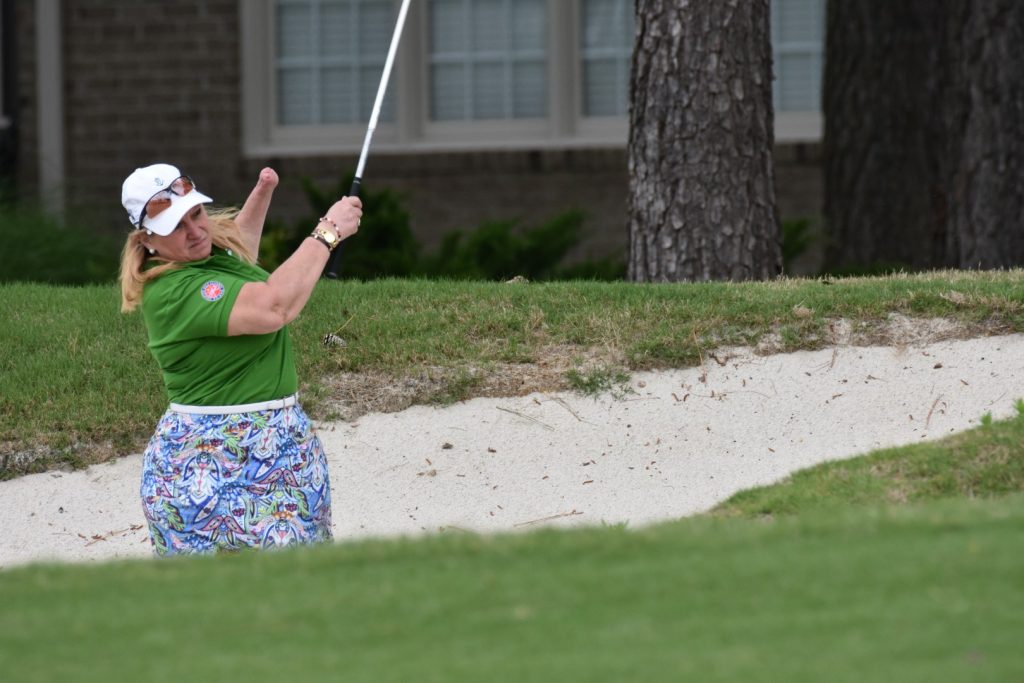
Gianna picks up the story, “We’re not meant to be isolated. We’re not supposed to be home, depressed, and left out of everything. We are social creatures. We need to be out and be around others. Golf is an independent activity. It’s between you, the ball and the hole and neither the ball nor the hole care if you roll it with your nose. Golf lends itself perfectly to someone who has any type of ability.” Gianna is a sought-after speaker and presenter and is walking the talk as a World ranked Golfer with a Disability. She now uses her voice and her growing reputation to help encourage and empower more people with disability to take up the game. “Everybody is different, and it depends on what you are looking for out of the game. It’s one of the things when I run my adaptive clinics, when we first start talking to a new golfer or someone who’s never played before, what is it that your expectations are? There’s the therapeutic activity side of it, then there’s the leisure game side of it. When you start talking about competitive fine-tuning, and getting into the competition part of golf, that’s a different mindset.”
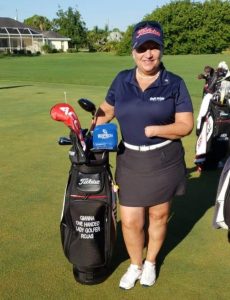
Golf has given Gianna a real-life purpose. It’s a way to help others and give back to society. Golf is the conduit that Gianna uses to help unlock the potential of people who so frequently question if they can do things. Gianna explains, “If you have the mindset that you can’t do something, doubt will always creep in and limit you. ‘Well I can’t. I only have one hand’, or ‘I can’t because I have one leg’, or ‘I can’t because I can’t get out of this wheelchair’. They ‘can’t’ themselves into not doing anything. What I like to try to do is, empower people with questioning, in a different part of the brain. ‘How can I?’ When you say, how can I, you’ve already decided you’re going to do it. We have to figure out the how part. Golf can unlock so many other areas of people’s lives.”
Gianna is making a difference in her unique way. Although she respects the cultures mindset to respect people, not to stare or ask questions, she now welcomes the looks and comments from others. She sees these occasions as opportunities to engage, build rapport and inform people that just because she has a different arm, it does not make her any less of a person. Yes, she has a visible impairment, but that limitation does not define her. She does not readily accept help from well-meaning people who mistake her ability to get things done but is also conscious that if she always refuses, she is robbing them of the gift of giving. Gianna advises, “Don’t always be so quick to offer help to somebody who has a challenge. Just because they’re not doing it the way you think that they could be doing it does not mean they can’t do it. Try to see everything from the other’s perspective.” Her Mantra ‘One person can make a difference, everyone should try’ – John Fitzgerald Kennedy (JFK). Gianna is doing just that.
Contact EDGA
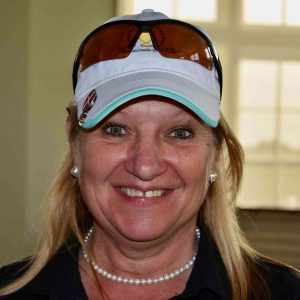
NB: When using any EDGA media, please comply with our copyright conditions


